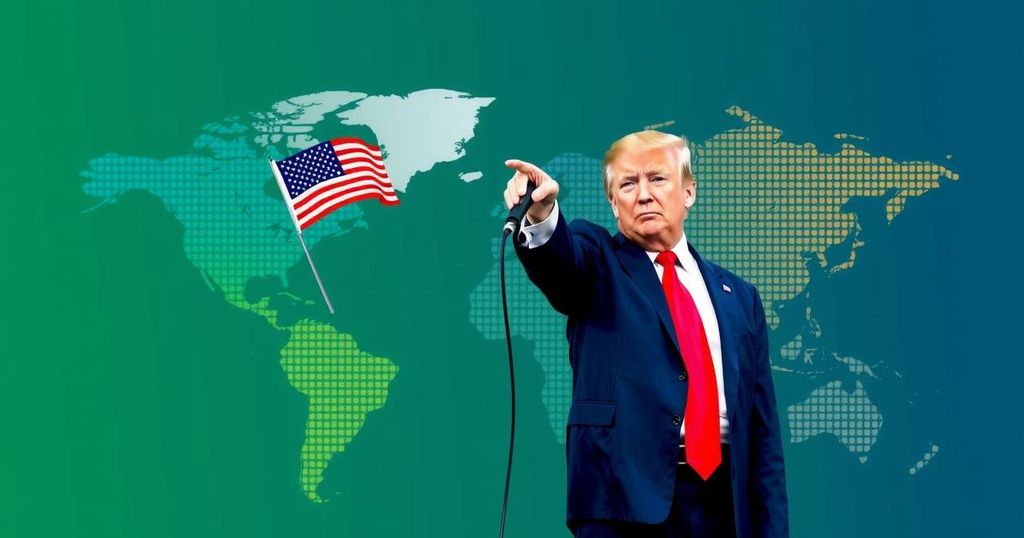Donald Trump’s recent election poses serious challenges for climate negotiations at COP29. His administration’s plan to withdraw from key agreements will likely hinder efforts to set new financial commitments, pressing Europe and China to take the lead. Developing countries will feel the impact of U.S. withdrawal, with a significant reliance on shared financial responsibilities. However, local U.S. initiatives may still drive continued progress towards climate goals.
The recent election of Donald Trump as President of the United States has raised significant concerns among international partners regarding the forthcoming COP29 climate summit. His administration’s stance, which includes plans to withdraw from key climate agreements, notably threatens the unity and efficacy of global climate efforts. Experts indicate that the critical goals of COP29, including establishing new global financing initiatives for climate action, could be severely undermined by Trump’s presidency, thus necessitating stronger leadership from both Europe and China in the effort to mitigate climate change. Trump’s previous declarations labeling climate change as a hoax and his potential withdrawal from the Paris Agreement, as well as discussions about exiting the UN Framework Convention on Climate Change, highlight a stark departure from collaborative climate policy. This development has left climate negotiators from around the world bracing for challenges at COP29, scheduled to take place from November 11 to 22 in Baku, Azerbaijan. The anticipated U.S. withdrawal dampens hopes for reaching consensus on new financial commitments, which are essential for fostering international cooperation in addressing climate-related issues. European Union representatives and stakeholders in climate finance are now tasked with leading discussions to ensure that progress is made, despite the absence of U.S. involvement. The potential failure to secure a robust climate finance agreement could lead to significant setbacks, particularly for developing nations that rely on international support for their climate initiatives. Comments from representatives of the Least Developed Countries underscore the urgency of shared responsibilities among all nations in combating climate change. Without U.S. leadership, the onus will largely fall on European nations and China to stabilize the framework for international climate action. Climate experts concur that while the political landscape may shift, the inevitable growth of renewable energy investments is likely to continue independently of U.S. policies. Moreover, the commitment of U.S. states and cities to uphold climate goals signals a grassroots endeavor to fill the vacuum left by the federal government’s changing stance. Notably, initiatives like the U.S. Climate Alliance and Climate Mayors are poised to actively participate in COP29. The trajectory of climate negotiations remains complex in light of Trump’s presidency, however, European and Chinese leadership appears essential to sustaining momentum in global climate efforts. International collaboration will need to adapt to the new U.S. political landscape, with local and state initiatives providing a buffer against potential regressions in federal climate policies. It remains clear that the oncoming COP29 summit will face hurdles in unifying the disparate global responses to climate change, emphasizing the critical role of collective action among remaining international actors. In conclusion, while Donald Trump’s re-election poses substantial challenges to the global climate agenda, particularly at COP29, the resilience of climate initiatives seen through ongoing renewable investments and active participation of U.S. states may ensure sustained progress. A concerted effort from Europe and China to lead the charge in climate finance will be essential for cultivating cooperative engagement in the global mission to combat climate change. The necessity for shared commitments across all nations stands as a paramount consideration amidst these emerging challenges.
The outlook for the COP29 climate summit has shifted dramatically following Donald Trump’s victory in the recent U.S. presidential election. Trump has openly expressed skepticism about climate change, indicating intentions to withdraw from pivotal agreements, such as the Paris Accord. As the world’s leading historical polluters, the United States, China, and the European Union share a critical responsibility in combating climate change. This backdrop sets a precarious stage for negotiations in Baku, as some nations brace for a potential leadership vacuum in climate policy without U.S. participation, heightening the pressure on other global actors to take decisive action.
The resounding implications of Donald Trump’s election signal a challenging road ahead for international climate negotiations at COP29. With a weakened U.S. role in climate leadership, other nations, particularly in Europe and China, must solidify their commitment to advancing climate initiatives. The ongoing investment in renewable energy within the U.S. at the local level suggests a persistent pursuit of climate goals, despite federal regressions. The fundamental necessity of unified global action remains crucial as nations navigate the complexities posed by the changing political environment.
Original Source: www.swissinfo.ch






